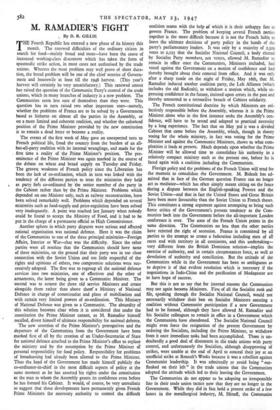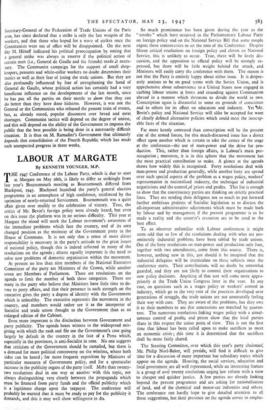M. RAMADIER'S FIGHT
By D. R. GILLIE
THE Fourth Republic has entered a new phase of its history this month. The renewed difficulties of the ordinary citizen in search for food—mainly bread and meat—have been the cause of increased working-class discontent which has taken the form of spasmodic strike action, in most cases not authorised by the trade unions. Whereas the meat problem may well prove of short dura- tion, the bread problem will be one of the chief worries of Govern- ment and housewife at least till the 1948 harvest. (This year's harvest will certainly be very unsatisfactory.) This renewed unrest has raised the question of the Communist Party's control of the trade unions, which in many branches of industry is a new problem. The Communists seem less sure of themselves than they were. This question has in turn raised two other important ones—namely, whether the problems of France are to be solved by a Government based as hitherto on almost all the parties in the Assembly, or on a more limited and coherent coalition, and whether the enhanced position of the Prime Minister provided by the new constitution is to remain a dead letter or become a reality.
The events of the first week of May gave an unexpected turn to French political life, freed the country from the burden of an all- but-all-party coalition with its internal wranglings, and made for the first time a reality of the Prime Minister's position. The pre- eminence of the Prime Minister was again marked in the course of the debate on wheat and bread supply on Tuesday and Friday. The gravest weakness of French policy since the Liberation has been the lack of co-ordination, which in turn was linked with the tendency of the different parties to treat the ministries they held • as party fiefs co-ordinated by the senior member of the party in the Cabinet rather than by the Prime Minister. Problems which depended on one Minister only, such as railway reconstruction, have been solved remarkably well. Problems which depended on several ministries such as food-supply and price-regulation have been solved very inadequately. A point was reached last January when nobody could be found to accept the Ministry of Food, and it had to be put in the charge of a permanent official as High Commissioner.
Another sphere in which party disputes were serious and affected rational organisation was national defence. Here it was the claim of the Communists to one of the three principal ministries—Foreign Affairs, Interior or War—that was the difficulty. Since the other parties were all resolute that the Communists should have none of these ministries, on the ground that their party was in too close connection with the Soviet Union and too little respectful of the rights and opinions of others, two compromise solutions were suc- cessively adopted. The first was to regroup all the national defence services into two ministries, one of effectives and the other of armaments, the latter being given to a Communist Minister. The second was to restore the three old service Ministers and create alongside them rather than above thenf a Ministry of National Defence in charge of commissariat and plans of mobilisation and with certain very limited powers of co-ordination. This Ministry of National Defence was given to a Communist. The absurdity of this solution becomes clear when it is considered that under the constitution the Prime Minister cannot, as M. Ramadier himself recalled, divest himself of ultimate responsibility for national defence.
The new assertion of the Prime Minister's prerogatives and the departure of the Communists from the Government have been marked first of all by the creation of an Under-Secretariat of State for national defence attached to the Prime Minister's office to replace the ministry and by the assumption by the Prime Minister of personal responsibility for food policy. Responsibility for problems of broadcasting had already been allotted to the Prime Minister. Thus the head of the Government has made himself publicly the co-ordinator-in-chief in the most difficult aspects of policy at the same moment as he has asserted his rights under the constitution as the man to whom the Assembly grants its confidence even before he has formed his Cabinet. It would, of course, be very unrealistic to suggest that these developments have permanently given French Prime Ministers the necessary authority to control the difficult
coalition teams with the help of which it is their unhappy fate to govern France. The problem of keeping several French parties together is the more difficult because it is not the French habit to leave the ultimate decisions of party policy in the hands of the party's parliamentary leaders. It was only by a majority of 2,529 votes to 2,125 that the Socialist National Council, a body elected by Socialist Party members, not voters, allowed M. Ramadier to remain in office once the Communists, Ministers included, had voted against the Government on a motion of confidence and had thereby brought about their removal from office. And it was only after a sharp tussle on the night of Friday, May 16th, that M. Ramadier induced another coalition party, the Left Alliance (which includes the old Radicals), to withdraw a motion which, while ex- pressing confidence in the future, insisted upon errors in the past and thereby amounted to a retroactive breach of Cabinet solidarity.
The French constitutional doctrine by which Ministers are col- lectively responsible before the Assembly, whereas it is the Prime Minister alone who in the first instance seeks the Assembly's con- fidence, will have to be tested and adapted to practical necessity by a long experience. The fact that on May 3rd it was a divided Cabinet that came before the Assembly, which, though in theory voting for the whole ministry, in fact was voting for the Prime Minister and against the Communist Ministers, shows to what com- plexities it leads at present. Much depends upon whether the Prime Minister will be allowed time to consolidate his authority in a relatively compact ministry such as the present one, before he is faced again with a coalition including the Communists.
Foreign policy and the problems of the French Union will tend for the moment to consolidate the Government. M. Bidault has ad- mitted that in face of the German question France can no longer act as mediator—which has often simply meant sitting on the fence during a dispute between the English-speaking Powers and the Soviet Union—and that in fact the United States and Great Britain have been more favourable than the Soviet Union to French theses. This constitutes a strong argument against attempting to bring such fierce critics of the Government's present tendency as the Com- munists back into the Government before the all-important London conference is over. The state of the French Union points in the same direction. The Communists no less than the other parties have rejected the right of secession. France is committed by all parties to the attempt to create a federation including men of all races and with territory in all continents, and this undertaking— very different from the British Dominion solution—implies the exercise of authority, and in certain circumstances force, as well as devolution of authority and conciliation. But the attitude of the Communists while in the Government has been so ambiguous as to deprive it of that evident resolution which is necessary if the negotiations in Indo-China and the pacification of Madagascar are to have hope of success.
But this is not to say that for internal reasons the Communists may not again become Ministers. First of all the Socialist rank and file, speaking through the Socialist National Council, would not necessarily withdraw their ban on Socialist Ministers entering a coalition without Communist participation if a new Government had to be formed, although they have allowed M. Ramadier and his Socialist colleagues to remain in office in a Government which the Communists have abandoned. The Socialist National Council might. even force the resignation of the present Government by ordering the Socialists, including the Prime Minister, to withdraw from it once immediate tasks had been accomplished. There is un- doubtedly .a good deal of discontent in the trade unions with party control, and unfortunately the Socialists, although disapproving of
strikes, were unable at the end of April to conceal their joy at an unofficial strike at Renault's Works because it was a rebellion against Communist leadership. It was admittedly to avoid being " out- flanked on their left " in the trade unions that the Communists adopted the attitude which led to their leaving the Government.
The Communists do not appear to be adopting an irresponsible line in their trade union tactics now that they are no longer in the Government. While they did in fact hold a protest strike of a few hours in the metallurgical industry, M. Henaff, the Communist Secretary-General of the Federation of Trade Unions of the Paris area, has since declared that a strike is only the last weapdn of the workers, and that those who hoped for a wave of strikes once the Communists were out of office will be disappointed. On the next day M. Henaff indicated his political preoccupation by stating that a general strike was always in reserve if the political action of certain men (i.e., General de Gaulle and his friends) made it neces- sary. The Communist campaign for the support of small shop- keepers, peasants and white-collar workers no doubt determines their tactics as well as their fear of losing the trade unions. But they are also profoundly influenced by fear of. strengthening the hand of General de Gaulle, whose political action has certainly had a very beneficent influence on the developments of the last month, since he has put all the parties on their mettle to show that they can do better than they have done hitherto. However, it was not the General or the Communists who released the present train of events, but, as already stated, popular discontent over bread and meat, shortages. Communist tactics will depend on the degree of unrest, and this will depend on the ability of the Government to impress the public that the best possible is being done in a necessarily difficult Situation. It is thus on M. Ramadiees Government that ultimately depends that consolidation of the Fourth Republic which has made such unexpected progress in three weeks.



































 Previous page
Previous page